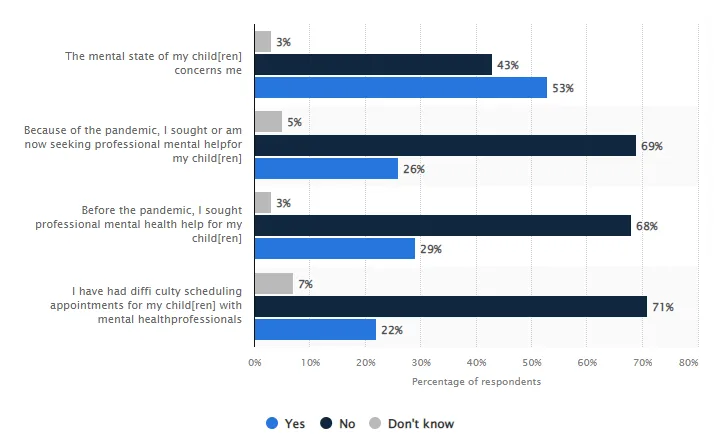Your kids will go through a lot of changes during their adolescent years. Heaps of brain development will certainly occur when kids hit puberty, as well as significant changes in their social life.
They will also start to seek independence from you.
Our preteens and tweens frequently believe that they are the most intelligent individuals on the planet.
They are now at a time in their lives when they are more prone to impulsive conduct and have trouble understanding the long-term ramification of their choices.
The shift from childhood to adolescence is a significant social, mental, physical, and emotional turning point for most children and teenagers.
Take it from any parent with children aged 8 to 14. Commonly, provocative tweens or teens are not quite easy to handle. What you may expect from these changes are outlined below:
A Parent-Child Bond That Matters
While we all know that parenting is the greatest rewarding job we can ever have, yet it comes with its share of hardships.
With a variety of strains on families, modern family life may be stressful and not always easy.
A healthy parent-child relationship can lead to improved parental guidance and the best for your child.
Having a close parent-tween/teen relationship is linked to good mental health, coping abilities, decision-making skills, scholastic achievement, and emotions of belonging, as well as strong self-esteem, according to research.
U.S. parents’ concern for children’s mental health as of 2021
Source Statista
Preteens and Tweens: What’s the difference?
The term “teen” or “teenager” refers to persons between the ages of 13 and 19.
This is the time when a person’s body develops and expands to prepare for maturity, and it’s during this time that they go through enormous changes, such as puberty.
Changes in height, weight, sleep habits, body odor, body hair development, and the commencement of the menstrual cycle (for women) are all common at this time.
Tweens go through the same changes and transitions as teenagers.
While everyone enters their tween years at a different moment, you’ll most certainly observe significant changes in your children between the ages of 8 and 12.
While there is no formal definition for tween, common definitions describe it as the period just before a person reaches the teenage years.
With that being said, even though both terms are complimentary, they are distinct from one another.
Tweens are those who haven’t yet reached adolescent years but are too young to be termed, kids.
Teenagers, on the other hand, are those who are between the ages of 13 and 19.
What does Tween mean in Age?
The tween years are when children reach the phase where they nearly appear to be between childhood and adolescence.
This change normally occurs between the ages of 9 and 12, just before puberty.
Moreover, because of all the changes that occur, it’s actually a highly essential developmental period for youngsters.
They are known for their increased independence.
They begin to experiment with new things in order to better understand themselves.
According to research, provocative tweens dominate your child’s attitude during this stage.
Below are signs that your kid is officially in their tween years:
Tween Shapes Their Own Identities
During this transition, tweens will not only experience physical changes, but also notable mental and emotional changes.
Your child may discover new interests, entirely change their attire, and even branch out into new friendship groups during these critical years.
The quest for their identity is ongoing, and it may take years for them to find something that makes them feel at ease again.
Changes In Their Social Conditions
Social changes are one of the more significant changes that occur throughout the tween years.
Pressure to fit in is frequently associated with these societal changes.
Unfortunately, this can lead to a lack of self-assurance, peer pressure, and social drawbacks.
When your tween enters the teen years, these social demands may grow. Social issues are likely to lessen in relevance as your kid increases its confidence and maturity at the conclusion of the teen years.
Increased Need For Time Alone
You need to understand that your teen will need privacy.
They may want to spend more time in their bedroom and have less parental participation in school, friends, and other aspects of their lives, among other things.
You’ll also notice that your tween may become apprehensive about revealing the details of their day or friendships with you, and they may even shut their door and insist that you knock before entering.
However, this does not imply that anything is going wrong about your tween. It only signifies that their connection with you is shifting – at least for the time being.
Why are the Tweens so Mean?
Hormones come in during the adolescent years, and puberty begins, usually accompanied by a shift in your child’s attitude.
When tweens are among the people they feel safe with, like their family -their attitude is at its worst.
As they adjust to their changing environment, and surging hormones, it’s difficult to navigate provocative tweens.
It’s important to remember that tweens are no longer children, but they aren’t young adults as well. During their tween years, your children may suddenly begin to push against limits.
Sarcastic remarks, eye-rolling, backtalk, abrupt outbursts, door slamming, and moody silences are all prevalent behaviors of provocative tweens.
But even though they can be difficult for parents at times, your love and support are still essential to your child – especially during this vital period of their life as they will not last forever.
So how can you keep in touch with your tween when they appear to be racing at full speed in the opposite direction?
Provocative tweens go through a lot of mental and emotional transformations. You can help them develop by doing a few things as parents.
Here are a few examples:
Don’t respond too quickly.
Keep your calm when dealing with your kids. The less you respond and get provoked, the more you will be able to apply your better judgment to handle the problem.
Define your limits.
To preserve a positive and meaningful relationship in these situations, it’s critical to establish the limits. The borders must be clearly defined to maintain respect and trust towards your child.
Reinforce the importance of rules and respect.
Our kids may be in a terrible mood or are somewhat upset with us. We need to allow them to express all of their feelings. They do, however, still need our guidance in terms of how to properly open those feelings and make sure they value our rules and authority.
Conclusion
Preteen and tween years may be difficult to manage and navigate due to all of the unexpected changes that occur.
Having to deal with provocative tweens in your life, whether they are your children, pupils, athletes, or your child’s friend is not an easy task.
However, by understanding what they are going through, you can begin to prepare yourself to assist them and provide them with the space they wish to have.
Good Luck in your journey!






